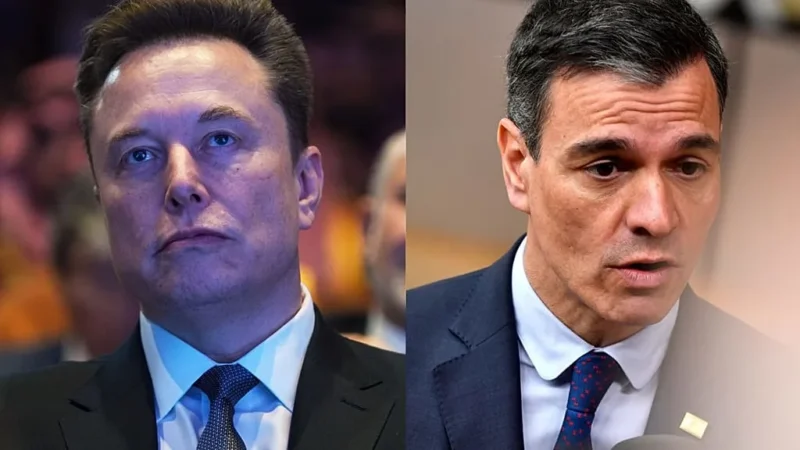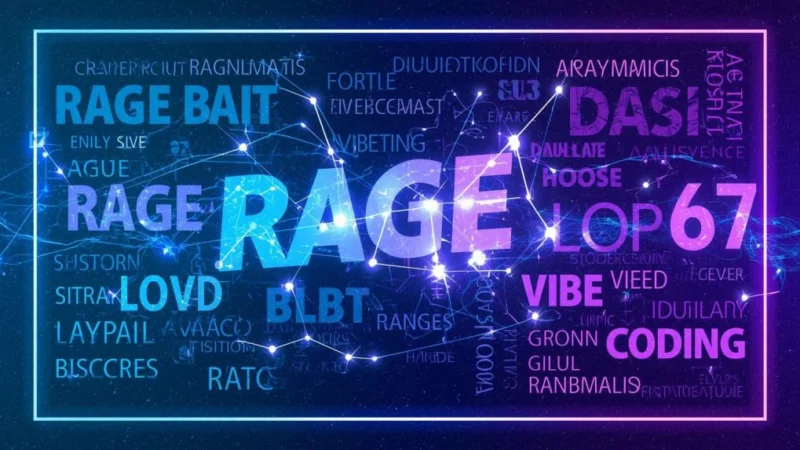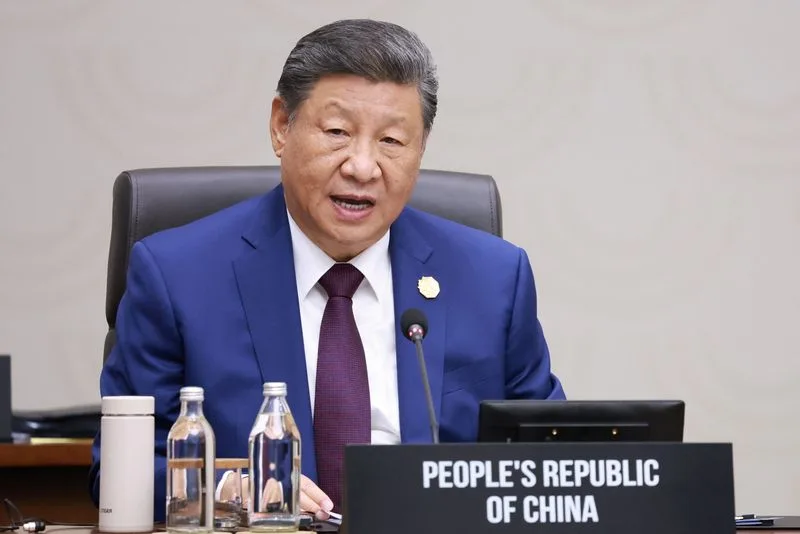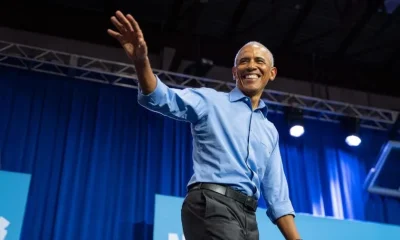TECH
Tech Giants Court Trump as Amazon Donates $1 Million to Inauguration

Bezos, Zuckerberg, and Silicon Valley’s Pivot Toward Trump Sparks New Alliances
Amazon’s $1 million pledge to President-elect Donald Trump’s inauguration signals a dramatic shift in its approach to political engagement. Historically critical of Trump, Amazon founder Jeff Bezos now joins a growing number of tech leaders fostering relationships with the incoming administration.
The donation, split between cash and in-kind streaming services on Amazon Video, comes amidst a broader thaw in relations. Bezos, who previously sparred with Trump over The Washington Post and antitrust concerns, has recently softened his stance. His public praise for Trump’s resilience during a summer assassination attempt and his decision to refrain from endorsing Vice President Kamala Harris in the 2024 election have fueled speculation of a calculated rapprochement.
Meta CEO Mark Zuckerberg has followed a similar path. Once banning Trump from its platforms, Meta recently donated $1 million to Trump’s inaugural fund, with Zuckerberg engaging in private discussions at Mar-a-Lago. Both tech magnates face accusations of seeking favor with the president-elect, as their companies navigate antitrust scrutiny and political pressures.
This pivot reflects Silicon Valley’s pragmatic response to Trump’s rising influence, potentially reshaping tech-political dynamics for years to come. However, the public backlash, including staff resignations and canceled subscriptions at The Washington Post, underscores the contentiousness of these alliances.
Social Media
Portugal Approves Law Restricting Social Media Access for Children Under 16

Under 16? In Portugal, social media now comes with conditions — and parental approval.
Portugal’s parliament has approved new legislation restricting social media access for children under 16, joining a growing list of countries tightening digital rules for minors.
Under the new law, the minimum age for autonomous access to social networking platforms, video-sharing services and open communication services will rise from 13 to 16. Children aged 13 to 16 will only be allowed to create and use accounts with express and verified parental consent. Those under 13 will be barred entirely from accessing platforms, services, games and applications covered by the legislation.
The restrictions apply to major platforms such as Instagram, Facebook and TikTok. Messaging services such as WhatsApp, widely used by families for communication, are not included.
The bill requires companies to implement age-verification mechanisms. For users between 13 and 16, account creation must be linked to Portugal’s Digital Mobile Key or a similar identification system that confirms age without publicly exposing additional personal data.
Lawmakers from the Socialist Party said platforms must also introduce features to reduce minors’ exposure to violence, explicit content, addictive gaming elements and manipulated media.
Oversight of the law will fall to Portugal’s National Communications Authority and the National Data Protection Commission. During parliamentary debate, opposition lawmakers raised concerns about enforcement, privacy protections and the possibility that young users could bypass restrictions using VPNs. Some critics also warned that the measure could infringe on personal freedoms.
Portugal follows similar moves elsewhere. Australia has enacted strict age-verification requirements for under-16s, while France recently approved limits for users under 15. Legislative efforts are also underway in Denmark, Italy and Spain, reflecting broader European concern over the impact of social media on children’s mental health and development.
TECH
European Governments Move Toward Social Media Bans for Children

European countries are accelerating efforts to restrict children’s access to social media, citing growing evidence that excessive online exposure harms mental health and cognitive development. The push has gained momentum after France advanced legislation to ban social media use for children under 15, and Spain signaled it would follow with a ban for those under 16.
Spain’s Prime Minister Pedro Sánchez said children must be protected from what he described as the “digital Wild West,” warning that platforms expose minors to addiction, abuse, and manipulation. France’s proposal now heads to the upper house of parliament, while similar measures are being discussed or drafted in Italy, Greece, Portugal, Austria, Denmark and the United Kingdom.
At the EU level, Ursula von der Leyen has expressed support for a bloc-wide minimum digital age, potentially aligned with Australia’s under-16 restriction. In November, the European Parliament recommended an EU-wide ban for children under 16, with limited access for 13- to 16-year-olds under parental consent.
Experts broadly agree that minors face heightened risks online but question how such bans would work in practice. One proposal under discussion is an EU-wide digital ID system that could verify age without revealing personal data. Critics, however, warn that age-verification tools raise privacy concerns and could be easily circumvented.
Some digital rights advocates argue that age bans are largely symbolic and fail to address deeper structural problems, such as addictive design features like autoplay and infinite scrolling. They also note that online addiction does not suddenly disappear at age 15 or 16.
The debate has highlighted frustration with the EU’s flagship Digital Services Act, which requires large platforms to mitigate risks to minors and adjust algorithms. Critics say enforcement has been slow and ineffective, prompting national governments to act on their own.
The issue has also sparked political backlash. Tech billionaire Elon Musk recently attacked Sánchez over Spain’s plans, accusing European leaders reminding that the debate over children’s safety online is now colliding with broader arguments about regulation, free speech, and Big Tech’s power in Europe.
Comment
Tech Titan Explodes as Spain Moves to Lock Kids Out of Social Media

Europe tightens the net on Big Tech — and Musk is furious. Is Spain protecting children… or crossing into digital authoritarianism?
Tech billionaire Elon Musk on Tuesday launched a blistering attack on Spanish Prime Minister Pedro Sánchez, accusing him of authoritarianism after Madrid unveiled plans to sharply tighten regulation of social media platforms—particularly to shield minors from online harm.
The clash was triggered by Sánchez’s announcement of a forthcoming legislative package that would bar children under 16 from accessing social networks and impose meaningful age-verification requirements on platforms operating in Spain. Under the proposal, executives could face legal liability if their companies fail to remove illegal or hateful content, a move the government says is necessary to end what it describes as the digital “Wild West.”
Musk, who owns the social media platform X, responded with characteristic bluntness, labeling Sánchez a “tyrant” and using a derogatory nickname for the Spanish leader. The remarks underline a widening rift between U.S. tech leaders who champion minimal moderation in the name of free speech and European governments pushing for stricter oversight.
Spanish officials argue the measures are long overdue. Sánchez said platforms would no longer be allowed to rely on “easily bypassed checkboxes” to verify users’ ages and warned that failure to comply could have legal consequences for those at the top. The aim, he said, is to curb the spread of hate speech and protect young users from harmful content.
The dispute unfolds as the European Union intensifies scrutiny of major tech firms. Brussels has already fined X for breaching transparency rules, and regulators across the bloc are exploring ways to enforce digital standards more aggressively. On Tuesday, French authorities searched X’s Paris offices as part of an investigation into alleged algorithm manipulation and possible foreign interference—an inquiry that has summoned Musk to testify. X said it was “disappointed but not surprised,” rejecting the allegations and warning that the probe threatens free expression.
For Sánchez, the confrontation with Musk plays into a broader European push to reassert control over online spaces, particularly where children are concerned. For Musk, it reinforces his self-styled role as a global critic of regulation he views as censorship. As Europe presses ahead with tougher digital rules, the standoff highlights a deeper question: who sets the boundaries of speech and responsibility in an increasingly regulated online world?
TECH
TikTok Finalizes Deal to Continue Operating in the United States

TikTok has finalized a long-awaited deal to spin off its U.S. operations, securing the future of the popular video app for millions of American users after years of political and legal uncertainty.
In a statement released Thursday, TikTok confirmed the creation of a new U.S.-based joint venture that will operate under what it described as strict national security safeguards, including protections around user data, algorithms, content moderation, and software systems.
Under the agreement, U.S. tech giant Oracle, UAE-based investment firm MGX, and private equity firm Silver Lake will each hold a 15% stake in the new entity. TikTok’s Chinese parent company, ByteDance, will retain a minority share of 19.9%.
President Donald Trump welcomed the deal, calling it a major victory for U.S. interests. “I am so happy to have helped in saving TikTok,” Trump wrote on social media, adding that the platform will now be owned by “Great American Patriots and Investors.”
For TikTok’s more than 200 million users in the United States, the immediate impact is simple: the app is staying online.
While the user experience is not expected to change overnight, key technical shifts are underway. The new U.S. entity will retrain TikTok’s algorithm using American user data, with Oracle overseeing the storage and security of that data — a move aimed at addressing long-standing concerns over Chinese access to sensitive information.
TikTok U.S. CEO Shou Chew will serve on a seven-member board dominated by American executives, including senior leaders from Oracle, Silver Lake, and Abu Dhabi-based MGX.
However, several questions remain unresolved. The deal’s valuation has not been disclosed, and Chinese authorities have yet to publicly comment on the final structure. Some legal experts also argue the arrangement may still fall short of fully separating ByteDance from TikTok’s U.S. operations, as required under U.S. law upheld by the Supreme Court.
The agreement also covers other ByteDance-owned apps, including CapCut and Lemon8, bringing them under the same U.S. security framework.
After briefly going offline earlier this year amid legal uncertainty, TikTok’s future in the U.S. now appears secured — at least for the foreseeable future.
TECH
2025’s Dictionary Mirror: Tech, Toxic Attention, and the Words That Warned Us

From AI Slop to Rage Bait, 2025’s Words Expose the Age of Outrage, Algorithms, and Parasocial Life.
If you want to understand 2025, skip the speeches and read the vocabulary. This was a year when language didn’t just describe reality—it documented a world rewired by platforms, generative AI, and the emotional economics of outrage. The “Words of the Year” chosen by dictionaries and news outlets weren’t uplifting slogans. They were caution signs.
Cambridge Dictionary pointed to “parasocial,” a term once reserved for celebrity fandom that now includes relationships people form with artificial intelligence. In a year shaped by personalized chatbots, public debate widened from influencers and pop stars to the psychological gravity of AI companions—especially for younger users, who can slide from curiosity into dependency without even noticing the slope.
Oxford University Press went with “rage bait,” content engineered to provoke anger and inflate engagement. It’s the business model of the modern feed: outrage sparks interaction, algorithms amplify it, and people end up mentally exhausted. Oxford’s framing was blunt: paired with last year’s “brain rot,” the concept captures a cycle in which the platforms don’t merely host bad behavior—they reward it.
Other contenders tracked adjacent obsessions. “Aura farming” described the subtle performance of charisma as a form of currency—polishing an online persona until it looks effortless. “Biohack” captured the drive to optimize the body and mind through routines, devices, and supplements. Collins ultimately chose “vibe coding,” a term for a new style of programming where you describe what you want and let machines translate it into code—less “variables and syntax,” more “intent and vibes.” A derogatory term, “clanker,” also floated through shortlists, reflecting how quickly annoyance at machines can harden into cultural slang.
Then came the truly generational wildcard. Dictionary.com leaned into “67” (“six-seven”), a piece of youth slang that even adults can’t reliably decode. Depending on who you ask, it can mean “so-so,” “maybe,” or simply a way to frustrate parents. The meaning almost doesn’t matter; the function does. It’s a reminder that language is also a gatekeeping tool—especially for Gen Alpha, which treats confusion as a feature, not a bug.
Australia’s Macquarie Dictionary chose the term that may haunt the decade: “AI slop”—low-quality content churned out by generative systems, often error-filled and frequently unwanted. If search made everyone a “search engineer,” the slop era demands people become “prompt engineers” just to filter reality from noise. Merriam-Webster and The Economist echoed the same unease, with The Economist even floating “sloptimism”—the idea that platform overload might finally force serious moderation or drive users away.
But the piece turns sharply toward what happens when toxic content isn’t just annoying—when it becomes dangerous. The author argues that slop, disinformation, cyberbullying, and extremist echo chambers create fertile ground for antisemitism and other hate crimes. In Israel, trauma from October 7, 2023 remains raw, while a “war of words” rages globally—where terms like “genocide,” “apartheid,” and “Holocaust” are deployed as weapons. The essay’s point is not that language is always harmless; it is that language can be a battlefield.
Even Hebrew, the text notes, is still searching for its 2025 word—though last year’s winner, “hatufim” (“hostages”), reflected national reality with painful clarity. Suggestions like “redeemed captive” capture a yearning for closure. The search for a word becomes a search for meaning.
That may be the quiet conclusion of 2025’s vocabulary: we are not just living through technological change, but through a struggle over attention, truth, and identity. The year’s standout words—parasocial, rage bait, AI slop—don’t merely define trends. They reveal what we were fighting, what we were becoming, and what we still don’t know how to control.
TECH
Beijing Moves to Set Global AI Rules, Challenging U.S. Tech Dominance

Chinese President Xi Jinping seized the spotlight at the APEC leaders’ summit on Saturday, proposing the creation of a World Artificial Intelligence Cooperation Organization — a global body to regulate and coordinate AI development — in a move widely viewed as Beijing’s bid to challenge U.S. dominance over emerging technology governance.
Xi’s call, delivered at the meeting in Gyeongju, South Korea, marks his first public endorsement of the initiative unveiled earlier this year.
“Artificial intelligence is of great significance for future development and should be made for the benefit of people in all countries and regions,” Xi said, according to China’s state-run Xinhua agency.
He framed AI as a “public good for the international community” and suggested the organization could be headquartered in Shanghai, positioning the city as a new global center for AI diplomacy.
The timing was no accident. U.S. President Donald Trump skipped the leaders’ plenary session, leaving for Washington after a one-on-one meeting with Xi that produced a one-year agreement to ease trade and technology restrictions — a modest détente in a rivalry that has defined global politics for much of the decade.
Xi’s absence of an American counterpart gave him the stage to promote China’s brand of “cooperative multilateralism” as a counterweight to Washington’s go-it-alone approach.
The proposed AI body underscores China’s ambition to shape the rules of the next technological frontier.
While Washington has resisted binding global regulation of AI, Beijing sees governance structures as a lever of influence — allowing it to standardize norms around data, algorithms, and safety protocols according to its own priorities.
Analysts say China hopes to export its model of “algorithmic sovereignty”, where state control over AI aligns with national security and industrial policy goals.
Beijing’s growing AI ecosystem provides tangible backing for that vision. U.S. chipmaker Nvidia remains indispensable to the global AI boom, but Chinese firms such as DeepSeek are rolling out competitive, lower-cost models optimized for locally produced hardware — a strategy that insulates China from U.S. export bans while advancing its technological self-reliance.
Beyond AI, Xi also urged APEC members to support the “free circulation of green technologies,” referencing sectors from batteries to solar panels — areas where Chinese firms already dominate global supply chains.
The summit concluded with the adoption of a joint declaration and agreements on AI governance and aging populations.
China will host the 2026 APEC summit in Shenzhen, a city Xi described as “a symbol of reform and innovation” that rose from fishing village to high-tech powerhouse in four decades.
By pushing for a global AI body and recasting China as a guardian of open cooperation, Xi is staking his claim to define the ethics and economics of artificial intelligence — and signaling that the contest with the United States has entered a new, algorithmic phase.
TECH
U.S. Eyes Sweeping Software Sanctions on China After Rare Earth Retaliation

Trump weighs unprecedented export curbs that could hit everything from jet engines to laptops, escalating the economic war with Beijing.
WASHINGTON, D.C. — The United States is weighing an extraordinary escalation in its tech standoff with China — a plan to restrict nearly any export made using American software, from jet engines to smartphones, in response to Beijing’s rare earth export controls, according to U.S. officials briefed on the matter.
If implemented, the move would weaponize Washington’s dominance in global software architecture — the invisible backbone embedded in everything from chip design to navigation systems — effectively extending U.S. jurisdiction to vast swaths of the global supply chain.
President Donald Trump hinted at the measure earlier this month, threatening to block “any and all critical software” exports to China and to impose 100% tariffs on Chinese goods by November 1.
Officials say the proposal remains under review but signals that Washington is ready to test the outer limits of economic statecraft.
“I will confirm that everything is on the table,” said Treasury Secretary Scott Bessent, adding that any export curbs “will likely be in coordination with our G7 allies.”
The policy — reminiscent of post-Ukraine sanctions on Russia — would bar not just direct U.S. exports but also foreign-made goods that rely on American software tools, potentially upending trade flows and pressuring global manufacturers to choose sides.
A senior official familiar with the discussions said the idea “is to remind Beijing that software is America’s rare earth — and we can close the tap, too.”
Yet the economic risks are immense. Industry analysts warn that such restrictions could boomerang on U.S. tech firms, given how deeply American code and algorithms are integrated into international production.
“You’d hope they only make threats they can live with,” said Emily Kilcrease, a former trade official now at the Center for a New American Security.
China has condemned the potential move as “unilateral economic coercion,” vowing to retaliate if Washington proceeds.
Beijing’s Foreign Ministry accused the U.S. of “long-arm jurisdiction” and hinted that China could expand its own export bans beyond rare earth elements — materials vital for electronics, defense systems, and electric vehicles.
The stakes are rising as Trump prepares to meet Chinese President Xi Jinping later this month in South Korea.
The proposal, insiders say, could serve as leverage ahead of that summit, or as a warning that the U.S. is prepared to match Beijing’s restrictions with full-spectrum economic retaliation.
For now, the White House remains silent, but markets are already reacting. The S&P 500 and Nasdaq both fell sharply following news of the deliberations, as traders braced for what could become the most far-reaching U.S. export control in history.
Comment
AI Hackers at the Gates: Europe’s Airports Just Faced the Future of Cyberwarfare

The ransomware attack that brought check-in systems to a halt at Heathrow, Berlin Brandenburg and Brussels airports this week was more than just another cyber incident. It was a warning shot — and one fired with the help of artificial intelligence.
Collins Aerospace, a key aviation systems provider owned by RTX, was the entry point. Once inside, the attackers crippled check-in and baggage services, grounding flights and stranding passengers across Europe. The European Union’s cybersecurity agency ENISA has confirmed the breach was ransomware — but the real story is how it was done.
Cybersecurity experts are blunt: AI has changed the game. No longer is hacking a slow burn carried out by lone wolves in basements. As Christian Perry of Undetectable AI put it, “AI can scan for weaknesses across huge systems in minutes and mimic user behavior so it doesn’t raise alarms.” In other words, the machines are learning to hide in plain sight.
For years, ransomware was about extorting money quietly. But airports — the most visible nodes in Europe’s infrastructure — are not quiet targets. They are political ones. Whether the attack originated in Moscow, Beijing, or from a non-state criminal cartel matters less than the signal: Europe’s arteries can be cut with keystrokes, not missiles.
And the ripple effects are enormous. Testachats, Belgium’s consumer watchdog, already says passengers are entitled to refunds but not compensation, a reminder that legal frameworks lag behind the new threat. Meanwhile, airlines are scrambling to rebuild trust in systems that just proved dangerously fragile.
The implications go further. If AI can paralyze Europe’s air hubs, what about hospitals? Power grids? Banking networks? Military logistics? What happens when a ransomware tool is fused with hostile state strategy, blending criminal extortion with geopolitical pressure?
Some argue AI will also be the cure — defending systems faster than humans ever could. That may be true. But this week’s chaos showed Europe is already on the back foot, chasing attackers who can outthink, outpace, and outmaneuver traditional defenses.
For travelers, it was a miserable weekend. For policymakers, it should be a wake-up call. The age of AI-driven cyberwarfare isn’t coming. It just arrived, boarding passes in hand.
-

 Minnesota2 months ago
Minnesota2 months agoFraud Allegations Close In on Somalia’s Top Diplomats
-

 Middle East2 months ago
Middle East2 months agoTurkey’s Syria Radar Plan Triggers Israeli Red Lines
-

 Editor's Pick2 months ago
Editor's Pick2 months agoWhy India Is Poised to Become the Next Major Power to Recognize Somaliland
-

 ASSESSMENTS2 months ago
ASSESSMENTS2 months agoSomalia’s Risky Pact with Pakistan Sparks Regional Alarm
-

 Analysis2 months ago
Analysis2 months agoTurkey’s Expanding Footprint in Somalia Draws Parliamentary Scrutiny
-

 Analysis2 months ago
Analysis2 months agoRED SEA SHOCKER: TURKEY’S PROXY STATE RISES—AND ISRAEL IS WATCHING
-

 Somaliland1 month ago
Somaliland1 month agoF-35s Over Hargeisa: The Night Somaliland’s Sovereignty Went Supersonic
-

 Somalia2 months ago
Somalia2 months agoIs Somalia’s Oil the Price of Loyalty to Turkey? MP Blows Whistle on Explosive Oil Deal


































